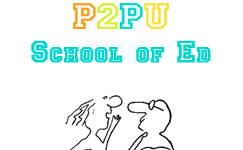(This is a part of a series on the differences and similarities between formal and informal adult learning.)
Before continuing, I should say just a bit about the School of Ed at P2PU and how it is different from other parts of P2PU.
First, the School of Ed is a pilot, and as such, we have some fairly unique characteristics, both when compared with traditional professional development (PD) and from the rest of P2PU.
The School of Ed differs from traditional professional development in many ways. All participation is voluntary, and there is no charge to participants. However, participants are asked to make some commitments in terms of directing their own learning, actively collaborating with the group, and working together on hands on projects. We encourage each participant to customize the course for their own needs. The focus of the School of Ed is on doing (writing, creating, reflecting, etc.), not just passively reading, listening, or viewing.
The School of Ed differs from other parts of P2PU as well. It is generally more structured than most P2PU courses. We have a somewhat common approach, format, syllabuses, etc. Other P2PU courses span a huge continuum from more structured “courses” to highly unstructured “study groups.” The School of Ed has highly-qualified experts developing our courses. In general, anyone can develop a P2PU course, so organizers may be highly-qualified experts or not.
In starting the School of Ed, we talked a lot (and continue to talk) about how traditional or not our approach should be. There are certain foundations we are committed to — peer learning, individualization, openness, community, and deeper learning. However, there are also certain more traditional things we are doing to make these courses “fit” into the existing K-12 system. Awarding credit (and even assessing participation) might be one of these.
It’s a fine line we’re walking, and we’re constantly refining.
Now on with today’s post…
—-
Instructors at a university, even for online courses being given for CEUs, undergo a rigorous vetting process. Sometimes there is an “instructor of record” process by which a proxy instructor is used for certification purposes. Absent that, instructors typically must have at least a masters in the field being taught and must complete a fairly lengthy application process. For the School of Ed pilot, this doesn’t pose much of a barrier, because we have assembled a very special group of highly qualified experts, a true dream team.
However, this is certainly not the norm. In fact, P2PU prides itself on the fact that anyone can put together and/or facilitate a course. In fact, open communities like P2PU are able to scale because of their ability to attract volunteers. Some of the volunteers are experts in their fields; others are great facilitators but may lack more formal qualifications.
In addition, it wouldn’t make logistical sense to try to put facilitators through a lengthy application process. Courses are constantly being created and run, and there is a stream of new facilitators joining us all the time. In fact, at the School of Ed, we hope that some of the participants in our first courses will go on to facilitate future iterations of these courses or even create their own new courses.
Powered by high-quality content (all P2PU content is also open licensed for sharing), self-directed learners organized in peer teams may drive the learning process more so than an instructor. What then is the role of a facilitator? Certainly, it is not the same as that of a traditional instructor.
To me, the roles of course developers and course facilitators are very different (although at P2PU, they are often one and the same). Given an expertly designed, high quality course, some of the roles of the facilitator are:
- To encourage participants to set their own goals and to customize the planned activities (or design their own) accordingly
- To answer questions, provide support, and recommend additional resources for participants
- To moderate synchronous sessions if applicable
- To encourage participants to collaborate with each other (peer learning) and to take on leadership roles as appropriate
And now considering the possibility of offering credit, a new role:
- To certify participant learning mastery
Stay tuned for a future post on assessment and grading!


